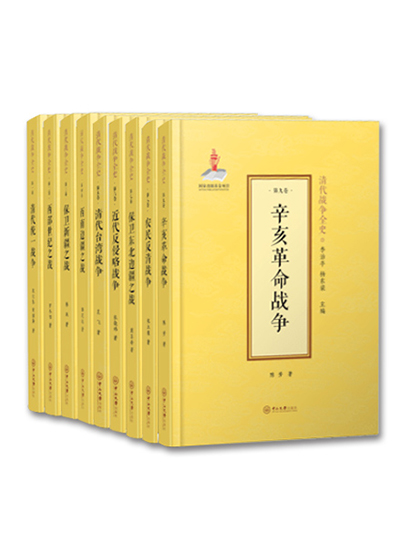A war history of Qing Dynasty

A Complete War History of the Qing Dynasty
The nine-volume A Complete War History of the Qing Dynasty, under the chief editorship of Li Zhiting, former director of the Institute of History at the Jilin Academy of Social Sciences, and Yang Dongliang, a professor with Renmin University of China, systematically delineates the whole process of wars in the Qing Dynasty (1644–1911), which lasted for more than 300 years from Nurhachi’s rebellion against the Ming (1368–1644) court to the outbreak of the Revolution of 1911.
The process witnessed the wars of dynastic alternation between Qing and Ming, as well as the wars of Qing with the Dashun regime, the Daxi regime, and the Zheng regime in Taiwan. It also included wars resulting from the intensification of class and ethnic contradictions, as well as wars of national defense caused by the invasion of foreign enemies. In particular, the series comprehensively expounds on the war history of early Qing and the anti-aggression wars in northeastern border areas around the 17th century, which are relatively underrepresented in existing research. This enables a more holistic study of the war history in the Qing Dynasty, avoiding the segmentation of the study of ancient Chinese history and modern history by the First Opium War (1840–42).
Although the series takes war as the object of discussion, its review is not limited to war only. Instead, it places war within historical contexts, examines bilateral economic conditions, military supplies, spiritual elements, strategies, and tactics. It displays the whole process of each war and vividly manifests the holistic view and comprehensiveness of war descriptions.
For instance, the volume of The War to Defend Xinjiang emphatically clarifies Tso Tsung-t’ang’s strategic policy for “raising provisions and funds for troops, and transporting military resources.” He explicitly confessed that “this western expedition is to recover Xinjiang as a righteous undertaking, not to compete for it,” highlighting the just nature of the war. The Yakub Beg group, losing the hearts of local people as a foreign invader, was ultimately deserted by its followers and scattered. The Battle to Defend the Northeast Frontier focuses on the heroic struggle of the people of all ethnic groups in northeastern China against the Tsarist Russian and Japanese invaders. In the volume of Modern Anti-Aggression Wars, the chapter of “The Opium War” unravels the pre-war world situation and compares Chinese and British political, economic, and military strength. The last volume of The Revolution of 1911 unfolds the broad picture of the revolution that overthrew the feudal monarchy in China that had lasted for more than 2,000 years.
Wei Jin is from the School of History at Renmin University of China.
Edited by YANG LANLAN
